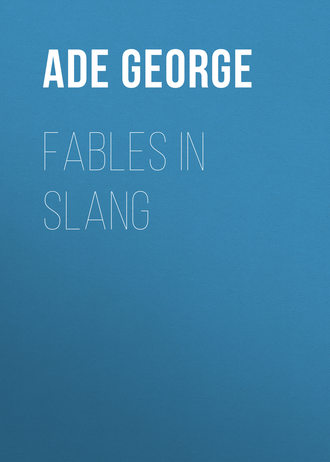
Ade George
Fables in Slang
THE FABLE OF THE BRASH DRUMMER AND THE PEACH WHO LEARNED THAT THERE WERE OTHERS
A well-fixed Mortgage Shark, residing at a Way Station, had a Daughter whose Experience was not as large as her prospective Bank Roll. She had all the component Parts of a Peach, but she didn't know how to make a Showing, and there was nobody in Town qualified to give her a quiet Hunch.
She got her Fashion Hints from a Trade Catalogue, and took her Tips on Etiquette and Behavior from the Questions and Answers Department of an Agricultural Monthly.
The Girl and her Father lived in a big White House, with Evergreen Trees and whitewashed Dornicks in front of it, and a Wind-Pump at the rear. Father was a good deal the same kind of a Man as David Harum, except that he didn't let go of any Christmas Presents, or work the Soft Pedal when he had a chance to apply a Crimp to some Widow who had seen Better Days. In fact, Daughter was the only one on Earth who could induce him to Loosen Up.
Now, it happened that there came to this Town every Thirty Days a brash Drummer, who represented a Tobacco House. He was a Gabby Young Man, and he could Articulate at all Times, whether he had anything to Say or not.
One night, at a Lawn Fête given by the Ladies of the Methodist Congregation, he met Daughter. She noticed that his Trousers did not bag at the Knees; also that he wore a superb Ring. They strolled under the Maples, and he talked what is technically known as Hot Air. He made an Impression considerably deeper than himself. She promised to Correspond.
On the occasion of his next Visit to the Way Station, he let her wear his Ring, and made a Wish, while she took him riding in the Phaeton. He began to carry her Photograph in his Watch, and show it to the Boys employed at the House. Sometimes he would fold over one of her Letters so they could see how it started out. He said the Old Man had Nothing But, and he proposed to make it a case of Marry. Truly, it seemed that he was the principal Cake in the Pantry, and little did he suspect that he could be Frosted.
But Daughter, after much Pleading, induced Father to send her to a Finishing School in the East. (A Finishing School is a Place at which Young Ladies are taught how to give the Quick Finish to all Persons who won't do.)
At School, the Daughter tied up with a Chum, who seldom overlooked a Wednesday Matinee, and she learned more in three Weeks than her Childhood Home could have shown her in three Centuries.
Now she began to see the other Kind; the Kind that Wears a Cutaway, with a White Flower, in the Morning, a Frock, with Violets, in the Afternoon, and a jimmy little Tuxedo at Night.
For the first time she began to listen to Harness that had Chains to it, and she rode in Vehicles that permitted her to glance in at the Second Stories.
She stopped wearing Hats, and began to choose Confections. She selected them Languidly, three at a time.
Then the Bill to the Way Station, and Father down with Heart Failure.
She kept Mr. Sothern's Picture on her Dresser, with two Red Candles burning in front of it, and every time she thought of Gabby Will, the Crackerjack Salesman, she reached for the Peau d'Espagne and sprayed herself.
One Day when the Tobacco Salesman came up Main Street with his Grips, on his way to visit the Trade, he met the Drug Clerk, who told him that She was Home on a Visit. So he hurried through with his Work, got a Shave, changed ends on his Cuffs, pared his Nails, bought a box of Marshmallows, and went out to the House.
Daughter was on the Lawn, seated under a Canopy that had set Father back thirty-two Dollars. There was a Hired Hand sprinkling the Grass with a Hose, and as Will, the Conversational Drummer, came up the Long Walk, Daughter called to the Hired Hand, and said: "Johnson, there is a Strange Man coming up the Walk; change the Direction of the Stream somewhat, else you may Dampen him."
The Drummer approached her, feeling of his Necktie, and wondered if she would up and Kiss him, right in broad Daylight. She didn't. Daughter allowed a rose-colored Booklet, by Guy de Maupassant, to sink among the Folds of her French Gown, and then she Looked at him, and said: "All Goods must be delivered at the Rear."
"Don't you Know me?" he asked.
"Rully, it seems to me I have seen you, Somewhere," she replied, "but I cahn't place you. Are you the Man who tunes the Piano?"
"Don't you remember the night I met you at the Lawn Fête?" he asked; and then, Chump that he was, and all Rattled, he told her his Name, instead of giving her the scorching Come-Back that he composed next Day, when it was Too Late.
"I meet so many People traveling about," she said; "I cahn't remember all of them, you know. I dare say you called to see Pu-pah; he will be here Presently."
Then she gave him "Some one's else," "Neyether," "Savoir-Faire," and a few other Crisp Ones, hot from the Finishing School, after which she asked him how the Dear Villagers were coming on. He reminded her that he did not live in the Town. She said: "Only Fahncy!" and he said he guessed he'd have to be Going, as he had promised a Man to meet him at Jordan's Store before the Bank closed.
As he moved toward the St. Nicholas Hotel he kept his Hand on his Solar Plexus. At five o'clock he rode out of Town on a Local.
Moral: Anybody can Win unless there happens to be a Second Entry.
THE FABLE OF SISTER MAE, WHO DID AS WELL AS COULD BE EXPECTED
Two Sisters lived in Chicago, the Home of Opportunity.
Luella was a Good Girl, who had taken Prizes at the Mission Sunday School, but she was Plain, much. Her Features did not seem to know the value of Team Work. Her Clothes fit her Intermittently, as it were. She was what would be called a Lumpy Dresser. But she had a good Heart.
Luella found Employment at a Hat Factory. All she had to do was to put Red Linings in Hats for the Country Trade; and every Saturday Evening, when Work was called on account of Darkness, the Boss met her as she went out and crowded three Dollars on her.
The other Sister was Different.
She began as Mary, then changed to Marie, and her Finish was Mae.
From earliest Youth she had lacked Industry and Application.
She was short on Intellect but long on Shape.
The Vain Pleasures of the World attracted her. By skipping the Long Words she could read how Rupert Bansiford led Sibyl Gray into the Conservatory and made Love that scorched the Begonias. Sometimes she just Ached to light out with an Opera Company.
When she couldn't stand up Luella for any more Car Fare she went out looking for Work, and hoping she wouldn't find it. The sagacious Proprietor of a Lunch Room employed her as Cashier. In a little While she learned to count Money, and could hold down the Job.
Marie was a Strong Card. The Male Patrons of the Establishment hovered around the Desk long after paying their Checks. Within a Month the Receipts of the Place had doubled.
It was often remarked that Marie was a Pippin. Her Date Book had to be kept on the Double Entry System.
Although her Grammar was Sad, it made no Odds. Her Picture was on many a Button.
A Credit Man from the Wholesale House across the Street told her that any time she wanted to see the Telegraph Poles rush past, she could tear Transportation out of his Book. But Marie turned him down for a Bucket Shop Man, who was not Handsome, but was awful Generous.
They were Married, and went to live in a Flat with a Quarter-Sawed Oak Chiffonier and Pink Rugs. She was Mae at this Stage of the Game.
Shortly after this, Wheat jumped twenty-two points, and the Husband didn't do a Thing.
Mae bought a Thumb Ring and a Pug Dog, and began to speak of the Swede Help as "The Maid."
Then she decided that she wanted to live in a House, because, in a Flat, One could never be sure of One's Neighbors. So they moved into a Sarcophagus on the Boulevard, right in between two Old Families, who had made their Money soon after the Fire, and Ice began to form on the hottest Days.
Mae bought an Automobile, and blew her Allowance against Beauty Doctors. The Smell of Cooking made her Faint, and she couldn't see where the Working Classes came in at all.
When she attended the theater a Box was none too good. Husband went along, in evening clothes and a Yachting Cap, and he had two large Diamonds in his Shirt Front.
Sometimes she went to a Vogner Concert, and sat through it, and she wouldn't Admit any more that the Russell Brothers, as the Irish Chambermaids, hit her just about Right.
She was determined to break into Society if she had to use an Ax.
At last she Got There; but it cost her many a Reed Bird and several Gross of Cold Quarts.
In the Hey-Day of Prosperity did Mae forget Luella? No, indeed.
She took Luella away from the Hat Factory, where the Pay was three Dollars a Week, and gave her a Position as Assistant Cook at five Dollars.
Moral: Industry and Perseverance bring a sure Reward.
THE FABLE OF HOW THE FOOL-KILLER BACKED OUT OF A CONTRACT
The Fool-Killer came along the Pike Road one Day and stopped to look at a Strange Sight.
Inside of a Barricade were several Thousands of Men, Women and Children. They were moving restlessly among the trampled Weeds, which were clotted with Watermelon Rinds, Chicken Bones, Straw and torn Paper Bags.
It was a very hot Day. The People could not sit down. They shuffled Wearily and were pop-eyed with Lassitude and Discouragement.
A stifling Dust enveloped them. They Gasped and Sniffled. Some tried to alleviate their Sufferings by gulping down a Pink Beverage made of Drug-Store Acid, which fed the Fires of Thirst.
Thus they wove and interwove in the smoky Oven. The Whimper or the faltering Wail of Children, the quavering Sigh of overlaced Women, and the long-drawn Profanity of Men—these were what the Fool-Killer heard as he looked upon the Suffering Throng.
"Is this a new Wrinkle on Dante's Inferno?" he asked of the Man on the Gate, who wore a green Badge marked "Marshal," and was taking Tickets.
"No, sir; this is a County Fair," was the reply.
"Why do the People congregate in the Weeds and allow the Sun to warp them?"
"Because Everybody does it."
"Do they Pay to get in?"
"You know it."
"Can they Escape?"
"They can, but they prefer to Stick."
The Fool-Killer hefted his Club and then looked at the Crowd and shook his Head doubtfully.
"I can't tackle that Outfit to-day," he said. "It's too big a Job."
So he went on into Town, and singled out a Main Street Merchant who refused to Advertise.
Moral: People who expect to be Luny will find it safer to travel in a Bunch.






